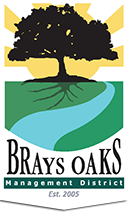
Commander Adrian Rodriguez
Officers and other staff at the Houston Police Department’s South Gessner Patrol Station recently welcomed their new commander, Adrian Rodriguez. Coming from a family of law enforcement officers, his leadership philosophy is about being a true partner with the community.
South Gessner Patrol is composed of four beats that cover an area south of the Southwest Freeway and north of South Main. The area includes part of the Brays Oaks Management District.
Q: Commander, tell us a little about yourself.
A: I am a native Houstonian, born and raised in the East End of the city. I graduated from Humble High School.
I am married and have two children, a 20-year-old son and a 17-year-old daughter who is a senior in high school and is getting ready to graduate and go off to college, which is very nerve-wracking. (He laughs). My son is in community college and aspires to a career in law enforcement or the fire department. I have been married to my wife as long as I have been in law enforcement and with the Houston Police Department for 18 years.
All of my career I have been in patrol, which is very refreshing for the officers in my division, being that they have a commander who can relate to their daily activities there on the streets.
Q: You talk about your son possibly following in your steps, did you always want to be in law enforcement or when did you decide this was your path?
A: I come from a family of law enforcement professionals. My dad retired from the Houston Police Department as a sergeant, my mother was a senior police officer who also retired from HPD. I also have a brother who is a sergeant with the Houston Police Department and works in the command center downtown.
I really always knew I wanted to be in law enforcement. My dad loved what the Houston Police Department offered him and the opportunities that it gave him. So, there was never a question, this was something that I felt I was called to do, as it was the same with my father. I love people, I love to get to know a person’s story, so to be in this type of career where I can help people is very encouraging to me.
Q; You talk about being around law enforcement your entire life, how has the profession changed in your eyes?
A: Definitely, law enforcement as a whole has changed, has evolved with the times. In my experience we definitely are more community-related than any other time and we have to be. We must have the community partner with us in everything that we are doing.
In the past, there has been that disconnect to where the perception was that law enforcement did not care. It is our job, our responsibility to ensure that the community knows that we are here for them. We must be able to make those contacts to engage the community in whatever relationships that we have.
The relational policing that we have established far exceeds other police departments nationally. We needed to change because of the environment that we see portrayed in the media. I want to be that person who makes those one-on-one contacts with the community. We have to reach out and let the community know that we are approachable, we are accessible, and this station is their station.
Q: Your station has a storefront, what is that?
A: We are one of the few stations in the city that has a storefront. Our storefront (6225 Southwest Freeway) is located at the far north end of our District 17 area. Our storefront gives more convenience to the community living in the northern part of our district, easier access for them. As well as offering a different option for reporting of crime, we have officers as part of our Differential Response Team located at the storefront. These officers are actively engaged with the community on coordinating events and functions for the community. Officers actually have their roll calls at the storefront.
Q: How many officers work the area?
A: At South Gessner our manpower is 144 officers. We are a mid-size station and have several squads within our station. We have a Crimes Suppression Team that concentrates on violent crimes. They just finished a very successful operation in which they were highly successful in getting a lot of drugs off the streets. In addition, making several violent crime criminal arrests and taking a large number of guns off of the streets.
We do have a Community Service and Differential Response Team. They deal with mainly quality-of-life and nuisance violations like trash or junk motor vehicles that are community eyesores. They also deal with the homeless population in a humane manner. We do not want to dehumanize the homeless population, but we try to give them access to options and resources before we do any type of enforcement. We do get a lot of concerns with the U.S. 59 corridor homeless encampments. Our division does bi-weekly sweeps with the Southwest Management District to clean up the area.
Q: How does the community get in touch with you for non-emergency reporting?
A: The non-emergency dispatch number is 713-884-3131 and our storefront number is 832-394-2660.
Q: You have been at South Gessner now for four months, what is your vision and goal as a leader moving forward?
A: I tell our officers that my vision is to make the most one-on-one contacts within our community. But not only that, the most positive one-on-one contacts, because we have a choice. If you project yourself in a negative manner, it is going to reflect on our whole organization. I have a huge responsibility here at South Gessner, I am in charge of the way things run, but the officers have a huge responsibility in that they represent our division and I want us to be the best division in the whole city, so I need their help.
Q: Since there is a responsibility for each of us in public safety, what would you like for citizens and businesses to do to assist your officers?
A: I would like for the public to be involved. I am not simply talking about going to events, although that is important. I want them to be actively involved in the problem-solving process and brainstorming. Give input like, “What do you think is the solution?” or “How would you approach this problem with a solution?” Because when we have that kind of culture that creates a united approach, people are invested in the process. Obviously, we have the resources and expertise, but we want our community to know that they are a part of the solution, and we are here to listen.
In our area, we have very strong partnerships with some very big organizations that are always willing to help us and show support. The Southwest Management District stopped by and dropped off food for our officers and talked to them. That type of support and environment is encouraging to our officers. We are grateful for that kind of outpouring. It reminds us that we do have a lot of support in the community. I tell the staff, there are far more people that do support us than not. We just don’t always get to hear from them.
I review the body camera footage from my officers daily, and I see the outstanding jobs that they are doing out there, and we will continue to strive to do more.
The commander ended our conversation with this: “At the end of the day we are all in this together. That is the ultimate message I want the community to have.“
— by Jessika Leal









